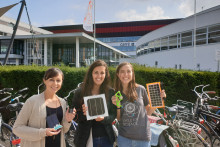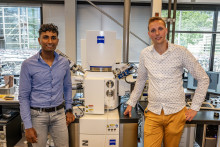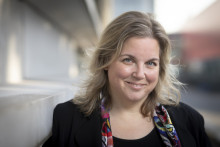The idea for the bike tour comes from the United States, where PhD students Rachel Woods-Robinson and Elizabeth Case decided to cycle across the US. ‘In the United States we face serious problems with climate change literacy and action. We learned in some schools climate science is not allowed to be taught. As researchers we wanted to go to these schools to talk about climate change and sustainable energy.’
Role model
Together the two researchers founded the organization Cycle for Science, which promotes sustainable energy in an interactive way. ‘Our loaded bicycles attracted a lot of attention and sparked conversations about sustainable transport. In the US, riding a bicycle as a primary means of transport is much less common than in the Netherlands. In addition to focusing on sustainable energy, we wanted to act as role models to young students, especially young women, and especially in parts of the country where interactions with scientists are less common. As women, we want to demonstrate and normalize the idea that women can and do pursue scientific careers.’
The Dutch version of Cycle for Science was initiated by Monica Morales-Masis and Rebecca Saive, both assistant professors at the UT. They conduct research in solar cell materials and saw Cycle for Science as an inspiring initiative. ‘At first I wanted to do the same kind of trip in Costa Rica,’ says Morales-Masis. ‘That is my home country, but it is logistically tricky since I am at the UT. We thought about Switzerland, where Woods-Robinson was interning and I used to work, but language would be a problem; during the secondary school lessons it is essential to communicate with students as directly as possible. That is why we decided to do this trip in the Netherlands, because students here have good English skills.’
Sustainable energy
The tour through the Netherlands is a great opportunity to combine physical exercise with scientific outreach, says Saive. ‘Of course, in the Netherlands it is much more normal to use the bicycle as a means of transport. We will attract less attention in that regard. But teaching sustainable energy and serving as a role model in secondary schools are also important goals in the Netherlands.’
During the tour the researchers will stop in Enschede, Hilversum, Leiden, and Zaandam for lessons at local high schools. The curriculum is as interactive as possible, says Morales-Masis. ‘We want to show that science is cool. That is actually the most important thing. Together with the students we will build solar cells. That is already possible with some simple kitchen attributes, such as toothpaste and red tea. The lessons are hands-on. It is important that students can see how it works with their own eyes.’
Co-founder Woods-Robinson is also joining the bicycle tour in the Netherlands next week. German mathematics researcher Lennart Bastian completes the group. ‘We hope that Cycle for Science will become even bigger,’ says Woods-Robinson. ‘The Dutch edition is part of the first “global” tour of Cycle for Science, and we are still open if anybody would like to join us next week.'







